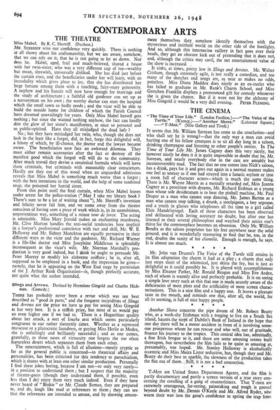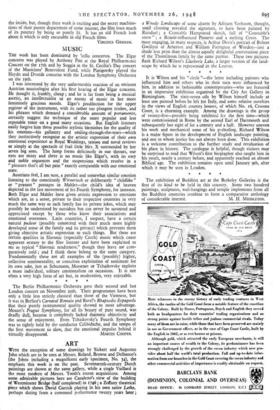THE CINEMA
"The Time of Your Life." (London Pavilion.)—" The Voice of the Turtle." (Warne,rd--" Another Shore. (Leicester Square.) —" T-Men." (New Gallery and Tivoli.)
IT seems that Mr. William Saroyan has come to the conclusion—and who shall say he is wrong?—that the only way a man can avoid hurting one of his fellow creatures is to sit all day long in a saloon, drinking champagne and listening to other people's stories. In The Time of Your Life, Mr. James Cagney does this very nicely, but however nicely he does it it is quite impossible to doubt that he, Mr. Saroyan, and nearly everybody else in the cast are amiably but incontrovertibly mad. The fact that no one comes into Nick's saloon, has a drink, pays for it and goes out again in a normal manner makes one feel as uneasy as if one had strayed into a lunatic asylum or into a room full of character actors—which is much the same thing. There is Mr. Wayne Morris as a mentally retarded oaf, Miss Jeanne Cagney as a prostitute with dreams, Mr. Richard Erdman as a young man whose sole desideratum is to beat the pinball machine, Mr. Paul Draper as a man who cannot stop dancing, Mr. James Barton as a man who cannot stop talking, a drunk, a stoolpigeon, a boy soprano, and a youth in glasses who telephones all the time to a girl called Elsie Mandelspiegel. Each of these characters has been observed and delineated with loving accuracy no doubt, but after one has listened to their several philosophies and watched their antics one's thirst for the commonplace becomes an obsession. Only Mr. William Bendix as the saloon proprietor has his feet anywhere near the solid ground, and it is wonderfully reassuring to find that he' too, in the end, doubts the sanity of his clientele. Enough is enough, he says.
It is almost too much. * * * *
Mr. John van Druten's The Voice of the Turtle still retains in its film adaptation the charm it had as a play' a charm that only the stops short of the whimsical, just skirts e fey, but is just as delightful as it could possibly be. It is played with accomplishment
by Miss Eleanor Parker, Mr. Ronald Reagan and Miss Eve Arden, each of whom is warmly alive and perfectly probable. It is on seeing a simple love story such as this that one is made acutely aware of the deficiencies of most plots and the artificiality of most screen charac- terisations. This is a nice film and a happy one. It leaves a pleasant taste in the mouth, and reminds one that, after all, the world, for all its seeming, is full of nice happy people. * * * *
Another Shore concerns the pipe dream of Mr. Robert Beatty who, as a work-shy Irishman with a longing to live on a South Sea island, haunts. the stefg of Dublin's Bank of Ireland in the hope that one day there will be a motor accident in front of it involving some- one prosperous whom he can rescue and who will, out of gratitude, finance his journey to the tropics. This central idea has, admittedly, a fine Irish brogue to it, and there are some amusing scenes built thereupon, but nevertheless the film fails to be quite as amusing as, presumably, was hoped. Mr. Stanley Holloway is alcoholically eccentric and Miss Moira Lister seductive, but, though they and Mr. Beatty do their best to sparkle, the slowness of the production takes
the fizz out of them. Still, it is not a bad concoction.
* * * * T-Men are United States Department Agents, and the film is partly documentary and partly a screen version of a true story con- cerning the coralling of a gang of counterfeiters. That T-men are extremely courageous, far-seeing, painstaking and tough is proved beyond doubt by Mr—Dennis O'Keefe and Mr. Alfred Ryder, who worm their way into the gang's confidence to spring the trap frbm the inside, but, though their work is exciting and the secret machina- tions of their parent department of some interest, the film loses much of its potency by being so poorly lit. It has an old French look about it which is only excusable in old French films.
VIRGINIA GRAHAM.





































 Previous page
Previous page